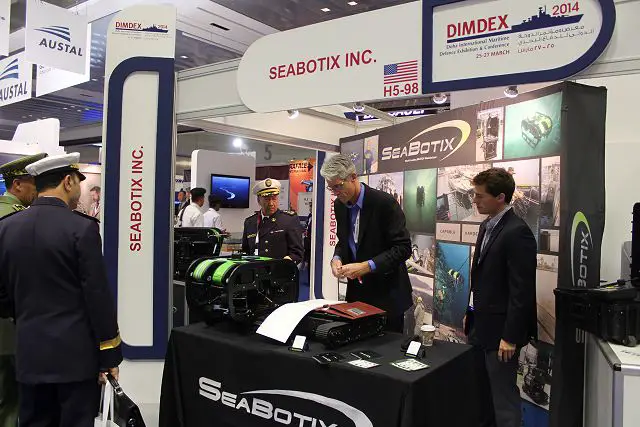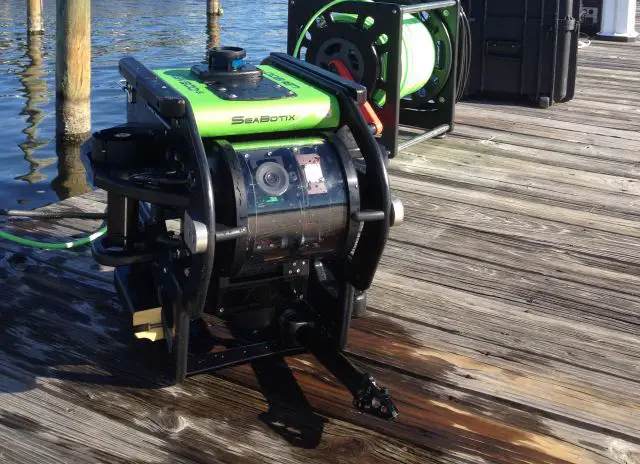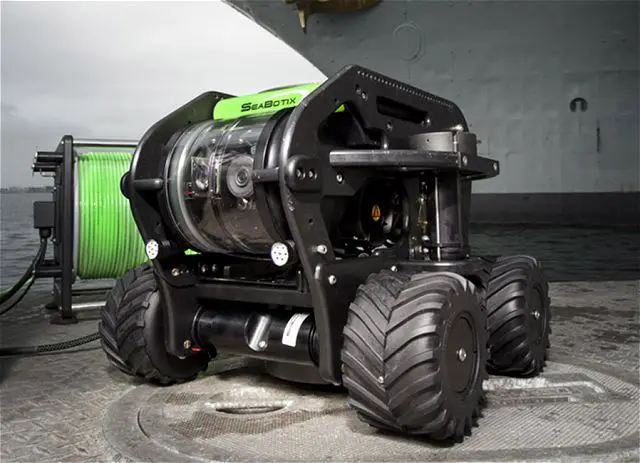|
|
| a |
DIMDEX
2014 Show Daily - Asis |
| |
|
| |
| |
SeaBotix
underwater remotely operated vehicles for military applications |
| |
SeaBotix,
located in San Diego, CA, USA is a leading manufacturer of tethered,
non-expendable underwater remotely operated vehicles used by militaries
in applications including port security, ship hull inspection, EOD/MCM
missions, critical infrastructure inspection, diver support, search
and recovery, and others. SeaBotix specializes in one-to-two person
portable, stable ROVs capable of observation and light work in diverse
conditions.
|
|

SeaBotics booth at DIMDEX 2014, the International Naval and Maritime
Defence Exhibition in Doha, Qatar.
|
|
For
military applications, the two most often selected Little Benthic Vehicle
models are the LBV300-5 and the vLBV300.
The LBV300-5 is a compact system with two horizontal thruster (forward,
reverse, and turning), one lateral thruster (sideways motion), and two
vertical thrusters (up and down). The LBV300-5 vehicle also includes
a high resolution color video camera and LED light that tracks 180-degrees
with the camera ensuring high-quality video with sufficient lighting
in nearly any position.
The LBV300-5 also includes a magnetic compass, depth and temperature
sensors, and auto-heading, auto-depth, and trim. An intuitive hand controller
and daylight-readable monitor in the Integrated Control Console allow
for simple control and viewing of the video and included sensor data.
The LBV300-5 is very popular in port security applications, searching
suspicious objects on the seafloor, retrieving objects off the bottom,
and performing inspection of ship hulls and infrastructure for IEDs
and contraband.
|
|

SeaBotix LBV300-5 MiniROV System |
|
One
of the defining features of the LBV300-5 is the optional, revolutionary
Crawler Skid Assembly with patented SeaBotix Vortex Generator. The Vortex
Generator is part of a 4-wheel skid that the LBV300-5 quickly mounts
to and becomes the Little Benthic Crawler. The Vortex Generator creates
an attraction force as high as 28 kgf (62 lbf) allowing the operator
to approach ship hulls or any other relatively flat surface of any material,
roll the LBC, and attach to the surface. In this mode, inspections can
be done in currents over 5 knots by driving along the surface. Without
operator input, the LBC will remain attached to the surface. This also
generates the best sensor data possible, as there is no relative motion
between the LBC and the surface being inspected. The LBV/LBC is the
most popular compact ship hull inspection system in the US Navy.
Both models can accept a wide variety of sensors including scanning
and imaging sonars for navigation and searches in poor/zero visibility,
tracking systems for precise location, altimeters for height off the
bottom, chemical sensors, water quality, etc. Probably the most popular
optional tool is the manipulator, which can be fitted with a number
of grabbing and cutting tools. Combined with the small diameter, low-drag
tether with 100 kgf (220 lbf) working load, both ROVs can be used to
grasp and lift heavy objects off the seafloor or deliver tooling and
other military packages.
|
|

SeaBotix Little Benthic Crawler System (LBV300 with optional Wheeled
Crawler Skid) |
|
The
vLBV300 system has four horizontal thrusters arranged in a vectored
format, providing nearly equal thrust in all horizontal directions allowing
for extreme current fighting capability. Two vertical thrusters provide
generous thrust up and down, and also serve to roll the vLBV300 to attach
to surfaces when the optional Tracked Crawler Skid Assembly is mounted
for inspections of ship hulls and critical infrastructure. The vLBV
is capable of carrying many types of sensors and mission-specific payloads,
such as when performing MCM missions. |